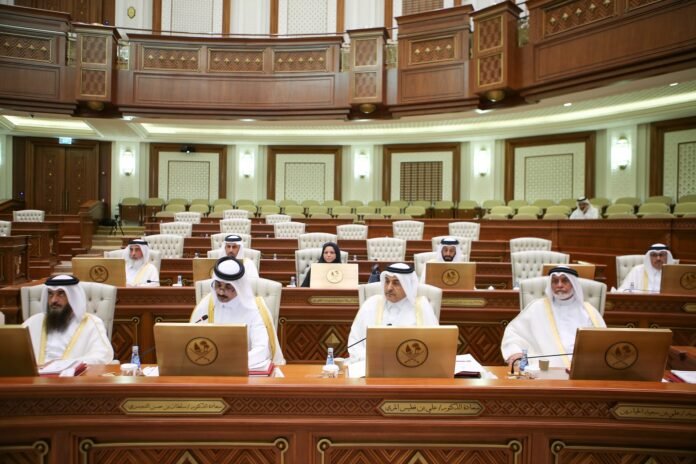The Shura Council held its 26th session of the third session of the sixth legislative term on Sunday. During this session, Mr. Ali bin Saleh Al Saleh, Speaker of the Shura Council, chaired the proceedings. The session began with the ratification of the previous meeting’s minutes. Following this, Ms. Karima Mohammed Al-Abbasi, Secretary-General of the Shura Council, presented several key items.
One important matter discussed was the draft law amending certain provisions of the Public Health Law, issued by Law No. (34) of 2018. This draft law had been prepared based on the Shura Council’s previous submissions. The Council referred this draft law to the Services Committee and the Legislative and Legal Affairs Committee for further review.
Another crucial topic was the framework agreement and agency agreements between the Government of Bahrain and the Islamic Development Bank. These agreements aim to finance the construction of the new 400-kilovolt Al-Jasra Power Plant, as attached to Decree No. (86) of 2024. The Council referred this matter to the Financial and Economic Affairs Committee and the Legislative and Legal Affairs Committee.
Additionally, the Council discussed the draft law that seeks to amend Article Two of Law No. (60) of 2006. This amendment focuses on reorganizing the Legislation and Legal Opinion Authority. The proposed change would reduce the minimum value of contracts subject to the Authority’s oversight from 300,000 dinars to 100,000 dinars. The goal is to enhance the control and monitoring of state expenditures.
The draft law aims to expand the Legislation and Legal Opinion Authority’s oversight over government contracts. However, Dr. Adel Abdulrahman Al-Mu’awda, the committee’s rapporteur, explained that several bodies are already responsible for monitoring and regulating contracts. These bodies include the Ministry of Finance, the Tender Board, and the State Audit Bureau. They ensure that government contracts comply with legal and financial standards.
Despite these existing mechanisms, the draft law’s supporters argue that lowering the threshold would help streamline the process. However, critics warn that it could slow down procurement procedures and increase the administrative burden on the Authority.
After careful deliberation, the Shura Council decided not to approve the draft law in principle. The Council chose to return the draft law to the House of Representatives for further consideration.
In addition to the contract amendments, the Council also discussed the audited financial statements for the fiscal year ending December 31, 2024. Dr. Anwar Khalifa Al-Sada, the Committee’s Rapporteur, confirmed that the Shura Council’s General Secretariat adhered to both national and international financial standards while preparing the statements. The State Audit Bureau issued an unreserved opinion on the financial statements, confirming that they accurately reflect the Shura Council’s financial position.
The Shura Council’s decisions on contracts and financial matters highlight the importance of balancing efficiency with oversight. These decisions play a critical role in managing Bahrain’s legislative and financial operations.


